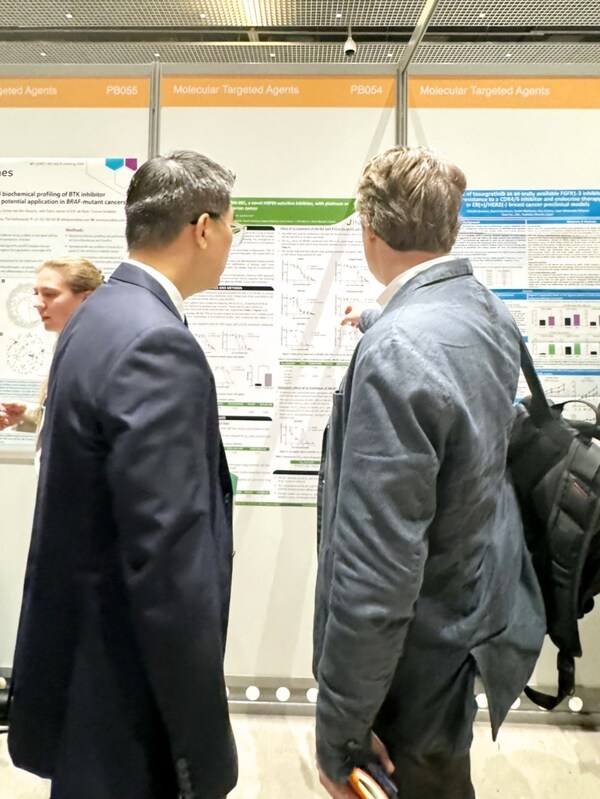SEOUL, South Korea, Oct. 24, 2024 /PRNewswire/ -- J INTS BIO, a leader in oncology drug development, has revealed interim preclinical results of its second-generation synthetic HSP90 inhibitor, JIN-001, at the ENA (EORTC-NCI-AACR) Symposium held in Barcelona, Spain, from October 23-25, 2024. The findings demonstrate JIN-001's potential as a new therapeutic option for cancer patients who have developed drug resistance after treatment, representing a significant advancement in addressing this critical challenge.

Ethan Seah, Vice President of J INTS BIO, is giving a poster presentation on the preclinical study of its novel oral 2nd generation HSP90 (heat shock protein 90) inhibitor ‘JIN-001’ at the ENA (EORTC-NCI-AACR) Symposium.
JIN-001: A Novel Approach to Overcoming Chemotherapy Resistance in Ovarian Cancer
Ovarian cancer remains one of the most aggressive and lethal gynecological malignancies, with approximately 70% of patients diagnosed at an advanced stage. While many patients initially respond to standard chemotherapy, drug resistance eventually develops, leading to disease progression and cancer relapse. JIN-001 was designed to address this issue and by targeting heat shock protein 90 (HSP90), a molecular chaperone that plays a crucial role in enabling cancer cells to adapt to therapeutic stress and survive.
By inhibiting HSP90, JIN-001 disrupts the ability of cancer cell to evolve and acquire resistance to the chemotherapy, thereby maintaining the effectiveness of existing standard treatment options. The preclinical studies presented at the symposium specifically explored the drug's efficacy when used in combination with established chemotherapeutic agents, offering new hope for patients with drug-resistant cancer.
A New Therapeutic Hope for Cancer Patients
The preclinical study was designed to evaluate the efficacy of JIN-001 in ovarian cancer cell lines, including those resistant to common chemotherapies such as paclitaxel and cisplatin. Researchers treated both normal ovarian cancer cell lines and chemo resistant strains with various concentrations of JIN-001, either alone or in combination with paclitaxel (PTX) or cisplatin (Cis).
Study Highlights:
JIN-001: A Game-Changer in the Treatment of Cancer
Combination Therapy with Chemotherapeutics: The most notable results emerged when JIN-001 was combined with conventional chemotherapy agents. When JIN-001 was used alongside paclitaxel, the IC50 value of paclitaxel in the resistant OV90/PTX200 cell line decreased from 0.204 μM to 0.043 μM, demonstrating a substantial improvement in therapeutic efficacy. Similarly, in the cisplatin-resistant OVCAR3-CisR cell line, the combination of JIN-001 with cisplatin reduced the IC50 of cisplatin from 9.643 μM to 0.142 μM.
JIN-001: A Breakthrough for Treatment-Resistant Ovarian Cancer
The interim results strongly suggest that JIN-001 has the potential to serve as a breakthrough companion therapy for patients with ovarian cancer. By inhibiting HSP90, JIN-001 enhances the efficacy of existing chemotherapies by limiting the adaptability and heterogeneity of cancer, thereby removing their ability to overcome the therapies.
"The synergy observed between JIN-001 and standard chemotherapy agents is extremely promising. It represents a new treatment paradigm for cancer patients," commented the J INTS BIO research team. "We are committed to further clinical development of JIN-001 to validate its efficacy and safety, and we believe this drug could offer a transformative option in limiting chemotherapy resistance."
JIN-001: Leading the Way in Innovative Cancer Therapies
JIN-001 has shown considerable promise as a novel therapeutic agent, particularly for chemotherapy resistance. J INTS BIO is committed to accelerating the clinical development of JIN-001, with plans to advance its use not only in ovarian cancer but also in other cancers, such as glioblastoma. Collaborative research with MD Anderson Cancer Center on JIN-001's potential in glioblastoma has already yielded positive preclinical results, with a Phase 1 trial anticipated in 2025.